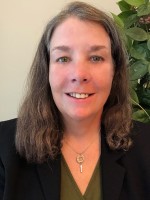Democracy and Freedom of Expression
Revitalizing Public Discourse on Campus and Beyond
with guest speaker
Leila Brammer
Director of the Parrhesia Program for Public Discourse at the University of Chicago
Tuesday, March 22
7:30 p.m. ET
Freedom of expression in academic and civic environments recognizes the centrality of multiple perspectives, differences, and disagreements to test and develop the best thinking to address collective challenges. Public discourse today is often critiqued for divisiveness that fails to reflect these foundational practices and leaves many unwilling to enter into essential conversations that should animate a healthy democracy. The lens of discourse theory exposes the limits of our current modes of discourse and suggests important ways to reimagine and transform how we engage with one another on campuses and in our communities.
Registration to attend in person is closed. Click here for location information.
Click here to register to join virtually.
 Leila Brammer is the Director of the Parrhesia Program for Public Discourse at the University of Chicago. Rooted in the Chicago Principles of Freedom of Expression, the Parrhesia Program curricula, programming, and outreach seek to foster the capacity for vigorous, inclusive, and productive discourse in the classroom, campus, and civic life. Building on the history and theory of freedom of expression and rhetoric, the curriculum and programming promote and model academic and civic practices of dialogue, deliberation, and advocacy. Outreach efforts include workshops and seminars for college/university and high school faculty and students to explore and embed both the principles and practices of open discourse in curricula, campus life, and surrounding communities.
Leila Brammer is the Director of the Parrhesia Program for Public Discourse at the University of Chicago. Rooted in the Chicago Principles of Freedom of Expression, the Parrhesia Program curricula, programming, and outreach seek to foster the capacity for vigorous, inclusive, and productive discourse in the classroom, campus, and civic life. Building on the history and theory of freedom of expression and rhetoric, the curriculum and programming promote and model academic and civic practices of dialogue, deliberation, and advocacy. Outreach efforts include workshops and seminars for college/university and high school faculty and students to explore and embed both the principles and practices of open discourse in curricula, campus life, and surrounding communities.
Previously, Dr. Brammer developed a civic engagement curriculum and public deliberation and dialogue program at Gustavus Adolphus College that were recognized nationally by the American Association of Colleges and Universities and the National Communication Association. In her work in public deliberation and dialogue, Dr. Brammer builds and facilitates frameworks in which community members come to understand problems from multiple perspectives and work together to develop evidence-based approaches to address challenging civic issues.